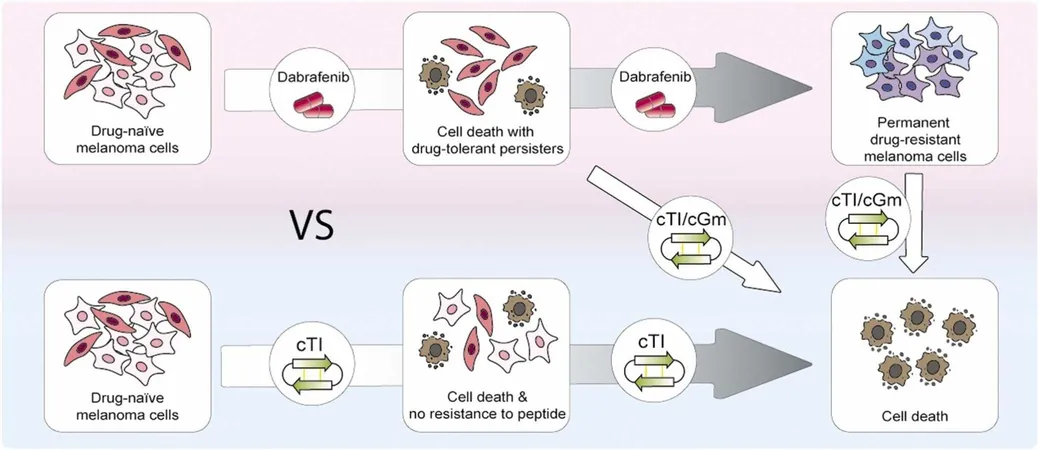
Could Horseshoe Crab and Tarantula Peptides Hold the Key to Overcoming Drug-Resistant Melanoma?
2024-12-16
Author: John Tan
Introduction
In a groundbreaking study that could revolutionize cancer treatment, researchers at Queensland University of Technology (QUT) have discovered that antimicrobial peptides derived from the Brazilian tarantula and the Japanese horseshoe crab may effectively combat drug-resistant melanoma. This pre-clinical research, conducted at Brisbane's Translational Research Institute (TRI), reveals a promising new approach to treating advanced cases of melanoma that have defied conventional therapies.
Research Findings
Published in the esteemed journal Pharmacological Research, the study showcases how the engineered peptides showed remarkable efficacy, successfully eliminating melanoma cells that normally resist existing treatments. Associate Professor Sonia Henriques, one of the leading researchers in the project, expressed excitement over these preliminary findings, highlighting the significant challenge posed by drug resistance in melanoma treatment.
"The ingenious design of these peptides by nature allows them to target bacterial cell membranes, which we have adeptly modified to focus on attacking the membranes of cancer cells without harming healthy tissue," said Professor Henriques.
Mechanism of Action
The research uncovered a thrilling aspect: these peptides not only destroyed rapidly dividing melanoma cells but were also capable of eliminating dormant cells and those that had gained resistance to other therapies. Their method of action, which directly disrupts the cell membranes, prevents the cancer cells from adapting and developing resistance, a common hurdle in oncology treatments.
Methodology
This comprehensive study, representing a decade of meticulous research, was conducted using both in vitro (laboratory cancer cell cultures) and in vivo (mouse models) methodologies. “Our goal is to refine these peptides further, enhancing not only their membrane-targeting properties but also their ability to penetrate and disrupt specific pathways crucial for cancer progression,” explained Professor Henriques.
Future Prospects
Co-author Dr. Aurelie Benfield echoed the optimistic vision, noting the wealth of potential in nature's evolutionary design. "There are countless peptides in nature, and our endeavor to modify and enhance their stability and potency is truly inspiring," she remarked. Dr. Benfield expressed pride in the team's accomplishments thus far and emphasized that the published results could herald a new era for therapeutic peptides in cancer care.
While the findings are promising, the researchers have acknowledged that substantial work lies ahead. It is estimated that another five years of testing and refinement will be necessary before these innovative therapies can be progressed to clinical trials involving human patients.
Funding and Industry Collaboration
The path to accelerating this life-saving research greatly depends on securing appropriate funding and interest from industry partners. “If we can harness the necessary resources, we can make significant strides in making this therapy a reality,” Dr. Benfield added.
Conclusion
As drug-resistant melanoma remains one of the toughest challenges in oncology, this study not only opens new avenues for treatment but also underscores the extraordinary potential that lies within nature's arsenal. The journey has just begun, and the world may soon see a breakthrough in the fight against one of the most aggressive cancers faced today.





 Brasil (PT)
Brasil (PT)
 Canada (EN)
Canada (EN)
 Chile (ES)
Chile (ES)
 España (ES)
España (ES)
 France (FR)
France (FR)
 Hong Kong (EN)
Hong Kong (EN)
 Italia (IT)
Italia (IT)
 日本 (JA)
日本 (JA)
 Magyarország (HU)
Magyarország (HU)
 Norge (NO)
Norge (NO)
 Polska (PL)
Polska (PL)
 Schweiz (DE)
Schweiz (DE)
 Singapore (EN)
Singapore (EN)
 Sverige (SV)
Sverige (SV)
 Suomi (FI)
Suomi (FI)
 Türkiye (TR)
Türkiye (TR)